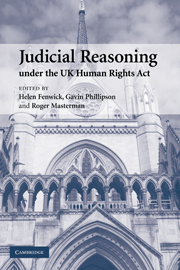Book contents
- Frontmatter
- Contents
- List of contributors
- Foreword
- Preface and acknowledgments
- Table of cases
- Table of legislation
- Table of treaties
- 1 The Human Rights Act in contemporary context
- PART I The interpretation of the Human Rights Act 1998
- PART II The Human Rights Act and substantive law
- 9 The common law, privacy and the Convention
- 10 Judicial reasoning in clashing rights cases
- 11 Family law and the Human Rights Act 1998: judicial restraint or revolution?
- 12 Article 14 ECHR: a protector, not a prosecutor
- 13 Criminal procedure, the presumption of innocence and judicial reasoning under the Human Rights Act
- 14 Concluding remarks
- Index
14 - Concluding remarks
Published online by Cambridge University Press: 30 October 2009
- Frontmatter
- Contents
- List of contributors
- Foreword
- Preface and acknowledgments
- Table of cases
- Table of legislation
- Table of treaties
- 1 The Human Rights Act in contemporary context
- PART I The interpretation of the Human Rights Act 1998
- PART II The Human Rights Act and substantive law
- 9 The common law, privacy and the Convention
- 10 Judicial reasoning in clashing rights cases
- 11 Family law and the Human Rights Act 1998: judicial restraint or revolution?
- 12 Article 14 ECHR: a protector, not a prosecutor
- 13 Criminal procedure, the presumption of innocence and judicial reasoning under the Human Rights Act
- 14 Concluding remarks
- Index
Summary
Introduction
Common lawyers tend to be somewhat apologetic about legal reasoning. It is not that they consider it to be an oxymoron. Rather, the subject is seen as too basic – not worthy of advanced investigation. This is perhaps because law students ‘cover’ ‘Legal Method’ at an early point in their studies and assume that, having mastered precedent and statutory interpretation, they can leave it behind in favour of more intellectually challenging topics. It is hard to imagine that a professional seminar in the United Kingdom on the topic of Legal Method would attract the involvement of virtually every senior member of the judiciary – as happened in New Zealand in 2001. Likewise, academic attention devoted to legal reasoning is marginal in comparison to substantive analysis, and is mostly reserved for ‘Jurisprudence’ (the thinking lawyer's diversion) under the guise of theories of adjudication.
However, this is an entirely appropriate focus for a study of the early impact of the Human Rights Act. It is not necessary to believe the New Labour hyperbole (in the days when ministers were still proud of the Act, rather than disowning its progeny) about the biggest legal change since Magna Carta. It is enough to acknowledge that comparing judgments before and after the Act that a major shift has occurred in their style, content and source material.
- Type
- Chapter
- Information
- Judicial Reasoning under the UK Human Rights Act , pp. 424 - 443Publisher: Cambridge University PressPrint publication year: 2007



